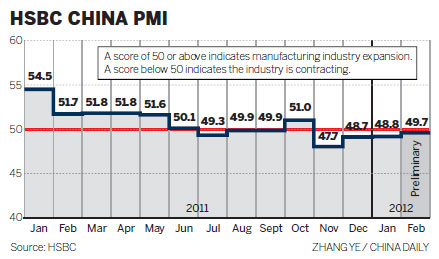Index rebounds to 4-month high
Updated: 2012-02-23 09:38
By Wei Tian (China Daily)
|
||||||||
BEIJING - China's industrial activity rebounded to a four-month high in February but is still contracting amidst the ongoing eurozone debt crisis, according to preliminary data.
In response, experts said they expect China to adopt further easing measures to help restore economic growth.
The preliminary HSBC China Manufacturing Purchasing Managers Index, a gauge of national manufacturing strength, increased to 49.7 in February from a final reading of 48.8 in January, the banking and financial services company HSBC Holdings PLC said on Wednesday.
|
 |
The index registered its highest reading since November 2011 but still indicated contraction in manufacturing. A score of 50 or above indicates expansion.
In the index's sub-indices, new export orders dropped to an eight-month low of 47.4 in February from 50.4 in January as the European debt crisis continued to reduce the demand for Chinese exports.
The decline continued a trend that China's trade figures had shown in January, which then decreased at their fastest rate since 2009. That month, total imports and exports declined by 7.8 percent year-on-year to $272.6 billion.
The higher reading this month was mainly driven by the industrial output sub-index, which rose to 50.1 in February from 47.6 in January, as well as by increased employment.
Qu Hongbin, HSBC China chief economist, said in a statement that the country's economic growth remains likely to slow down, despite the small improvement in the preliminary purchasing managers index, which was driven upwards by the quickening in production that followed the Chinese New Year.
"With no meaningful rebound in domestic demand in sight, and worsening external demand, there are more risks for China's growth," Qu said.
According to a statement on the National Bureau of Statistics' website on Wednesday, China's industrial output grew by 10.7 percent in 2011, down from 12.1 percent in 2010.
Qu said as inflation pressures continue to ease, the central bank is expected to further ease tightening measures, following its first cut this year in the amount of reserves banks are required to set aside.
Chinese financial institutions made 738 billion yuan ($117.2 billion) worth of new loans in January, well below the 1 trillion yuan worth expected by markets.
In response to tight liquidity, the People's Bank of China cut banks' reserve requirement ratio last Saturday by 50 basis points to 20.5 percent, which was expected to free up about 400 billion yuan that can be used in lending.
"We are expecting another reserve cut this month, and two to three more this year, as part of China's moderate, targeted and controllable policy easing," according to a research note by the financial services firm JP Morgan.
The slow pace of easing is partly a reaction to overly optimistic expectations about the market, JP Morgan said.
"So if those expectations again get ramped up because of the bank reserve cut, the authorities may again take steps to manage them back down," the firm said.
The preliminary purchasing managers index figure, also called the HSBC Flash China PMI, is calculated using from 85 percent to 90 percent of the responses made to a survey HSBC conducts each month. It comes out about a week before the release of the official purchasing managers index.

 Relief reaches isolated village
Relief reaches isolated village
 Rainfall poses new threats to quake-hit region
Rainfall poses new threats to quake-hit region
 Funerals begin for Boston bombing victims
Funerals begin for Boston bombing victims
 Quake takeaway from China's Air Force
Quake takeaway from China's Air Force
 Obama celebrates young inventors at science fair
Obama celebrates young inventors at science fair
 Earth Day marked around the world
Earth Day marked around the world
 Volunteer team helping students find sense of normalcy
Volunteer team helping students find sense of normalcy
 Ethnic groups quick to join rescue efforts
Ethnic groups quick to join rescue efforts
Most Viewed
Editor's Picks

|

|

|

|

|

|
Today's Top News
Health new priority for quake zone
Xi meets US top military officer
Japan's boats driven out of Diaoyu
China mulls online shopping legislation
Bird flu death toll rises to 22
Putin appoints new ambassador to China
Japanese ships blocked from Diaoyu Islands
Inspired by Guan, more Chinese pick up golf
US Weekly

|

|






